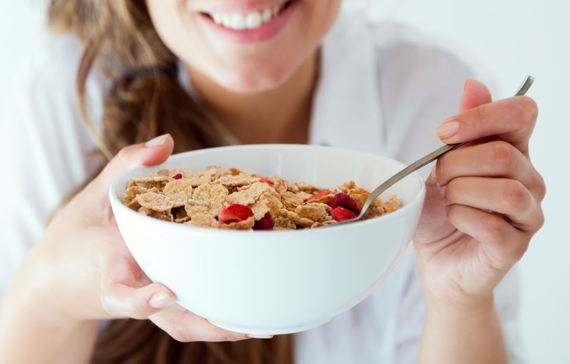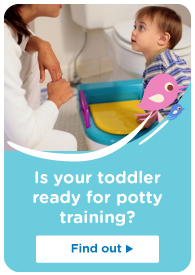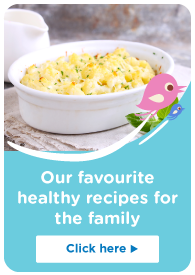10 tips to help you maintain a healthy diet
Filed under:
MummyBloggers

A healthy diet filled with real food can mean better blood sugar levels, a longer life, better focus, less risk for disease, a healthier heart, better digestion, and a naturally healthy weight that we don’t always have to feel the need to manage.
However, the term healthy eating means many different things to just about everyone and not one set meal plan will work for every single individual out there.
I’m a nutritionist who has experimented with a variety of diets, studied nutrition for over 10 years, and worked with clients from across the country.
1. Always start with fresh food
Fresh foods and produce should be a part of every single meal you eat. Going all day and subsisting on diet bars, shakes, fast food, and caffeine will set you up for nutritional deficiencies and leave you unsatisfied.
Select one, two, three or more produce items to add to each meal you eat, and remember that vegetables, greens, and fruits contain vitamins and minerals that other foods don’t offer. They also help hydrate us and satisfy us despite that they’re low in calories.
2. Listen to your hunger
This may sound obvious, but most people miss this key part of the puzzle. If you’re hungry, eat. If not, don’t. While you should not go over five hours during the day without eating when you have a busy schedule, if you’re not hungry when you first wake up, wait until your body tells you it’s ready to eat. Have lunch at the time your body tells you it needs some mid-day fuel. Come dinnertime, don’t feel as though you need a huge meal to unwind after a long day or feel as though you need to restrict portions if you’re a little hungrier than others some nights.

3. View food as more than calories
There are plenty of low-calorie diet items you can buy at the store these days, but packaged diet foods are not the key to living and eating healthy. Yes, calories do matter and just because quality calories are better than processed calories, it doesn’t mean you can overeat and stuff yourself. However, food is more than calories, and it’s ten times better to eat 200 calories from fresh foods and clean sources of protein than it is to eat a 100 calorie snack pack for lunch.
4. Remember the importance of blood sugar
Refined carbohydrates like refined grains and all-added sugars can spike blood sugar levels and lead to health issues like Type 2 diabetes or weight gain. Insulin spikes when we eat, and to keep insulin working properly, we need a balanced intake of lean protein, fiber, and some healthy fats. Think veggies, greens, lean protein, and moderate intake of fruits and healthy fats. If you tolerate grains, always go for whole grains like oats or quinoa for optimal blood sugar levels since they digest more slowly than processed carbs like bread or cereal.
5. Skip sugar
Many people believe that sugar is harmless, however, I’m not one of those people. Refined sugar - and even many natural, added sugars - usually lead to overeating as well as blood sugar issues. They also age the skin and trigger overeating or more sugar cravings. This doesn’t mean you can’t enjoy your birthday cake or dessert on Thanksgiving, it just means that sugar in most all forms should not be a part of your healthy eating routine.

6. Remember fat is not the enemy
Dietary fat is something that most of us have been confused about. I’ve eaten a low-fat diet and a high-fat diet and neither felt so great in my body, however, I know many people that thrive on both styles of eating. No matter what way works for you, we need to remember that fat is not the enemy. Fat can satiate the body, keep the hair and skin healthy, and it also boosts mood and energy when we eat it in the proper amounts for our body. Many healthy foods like wild salmon, avocado and eggs have fats as do sources such as flax, chia, hemp and a variety of nuts and seeds.
7. Keep it simple
One thing that really helps most people I work with, as well as me personally, is to keep things simple. There’s no need to eat a different meal every single night or feel the need to spend an hour preparing it. Keep your meals simple and stick to the lean protein, fresh produce (veggies, greens, and fruit), and healthy fats at each meal. Rotate your favorite meals through the week, and take advantage of kitchen appliances like a blender and slow cooker for quick meals and easy meal prep each day.
8. Eat mostly from your fridge
Focus on filling the fridge with fresh foods, not reaching in the pantry when you’re ready to eat each meal. Skip the cereal, bars, and processed options which all usually have added sodium, processed fats, and added sugar. Ready-made foods are not as nutritionally dense as fresh foods are, so attempt to quit reaching for them every time you’re hungry. When it comes to condiments, they can be fine to add to fresh meals to make things more interesting. Just be mindful of the sodium, fat and sugar content in each one you buy. Some good options include mustard, hot sauce, no salt seasonings, and apple cider vinegar.
9. Purge the pantry
Make it a goal to only have whole foods in your pantry such as canned tomatoes, beans, lentils, whole grains, herbs and spices, and maybe some jars of nut butter (refrigerate after opening). Get rid of the chips, canned soups and sugary cereals, and donate those or throw them out.
10. Remember that one size doe not fit all
One of the best pieces of advice I can give to anyone is to remember that one size doesn’t fit all when it comes to health and what diets work best. What works wonderfully for our parents, significant other, or best friend may not work for us. At the end of the day, our individual hormones, current health issues, our activity levels, gut health, sleep habits, and stress levels all affect our health just as much as food. Many of us will need more of certain foods while others will need to eat completely different diets.
Evee Parroche is a personal trainer and mum to a five-month-old baby. She blogs at Fit Bumps and Mums, where she provides top tips for a fit and healthy pregnancy, and also healthy ways to get back into shape after having your baby.

















